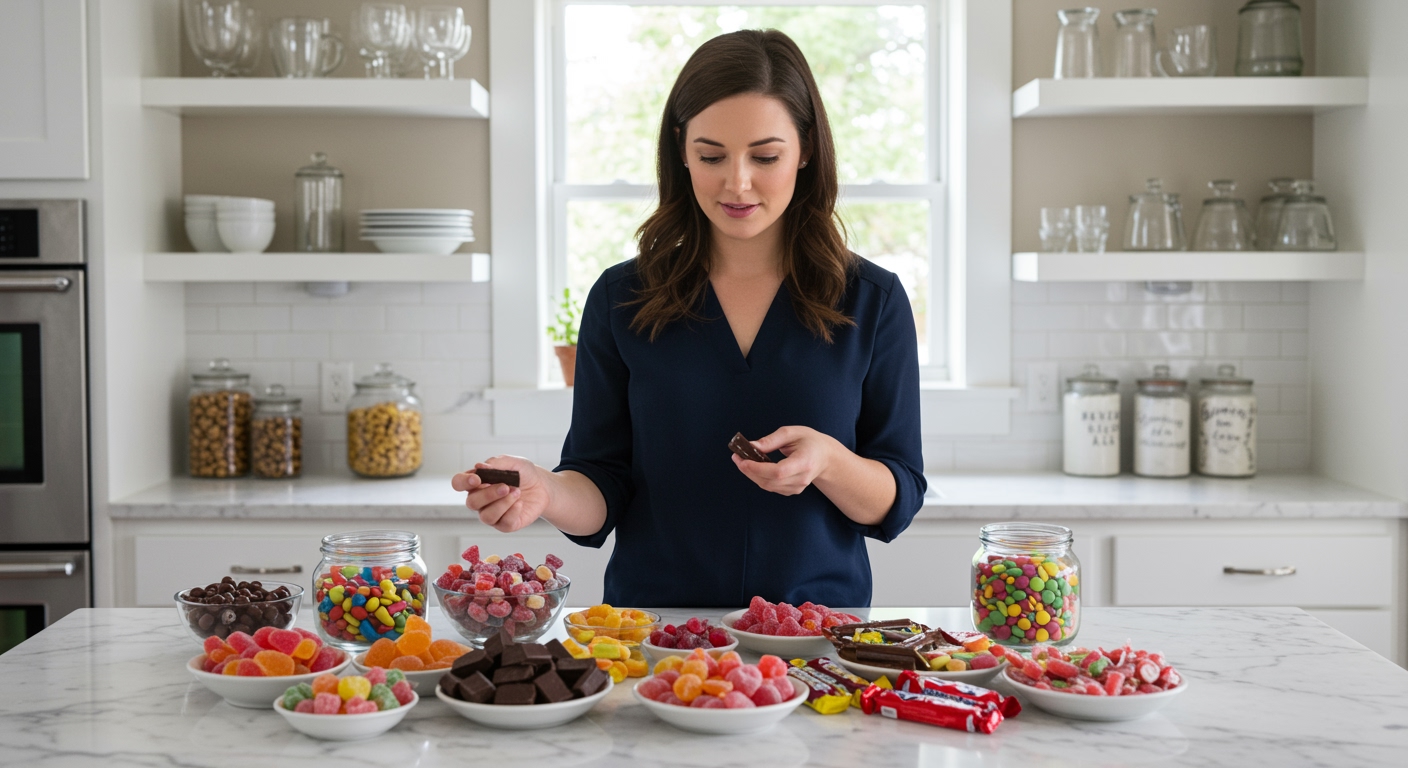✪ Key Takeaway: Candy is not always bad for PCOS when consumed mindfully in small amounts and paired with protein or fiber-rich foods.
Introduction
You stare at that piece of chocolate in the grocery store checkout line, wondering if one small bite will send your PCOS symptoms into overdrive.
Most women with PCOS have been told that candy equals enemy, but this black-and-white thinking might be doing more harm than good to your mental health and relationship with food.
Hi, I’m Abdur, your nutrition coach, and today I’m going to explain why candy doesn’t have to be completely off-limits when you have PCOS.
Does All Candy Affect PCOS The Same Way?
Not all candy creates the same blood sugar response in your body.
Dark chocolate with 70% or higher cocoa content contains compounds called flavonoids that may actually help improve insulin sensitivity.
Hard candies and lollipops often contain fewer calories per piece compared to chocolate bars loaded with saturated fats.
Gummy candies made with real fruit juice provide some vitamins, though they still contain added sugars that can spike insulin levels.
Sugar-free candies sweetened with stevia or erythritol won’t directly impact your blood glucose, but they may cause digestive upset in some people.
The key difference lies in how quickly each type of candy gets absorbed into your bloodstream and triggers your body’s insulin response.
✪ Fact: Dark chocolate contains magnesium, which many women with PCOS are deficient in and need for proper insulin function.
When Might Candy Actually Help With PCOS?
Completely restricting candy can lead to binge eating episodes that are far worse for your PCOS than enjoying small amounts mindfully.
A small piece of dark chocolate after a balanced meal can satisfy your sweet tooth without causing major blood sugar spikes.
When you’re experiencing severe stress, which worsens PCOS symptoms, a small treat might help you manage cortisol levels better than complete deprivation.
Some women find that allowing themselves planned candy treats prevents the restrict-binge cycle that disrupts their hormones more than the candy itself.
During your luteal phase before menstruation, your body naturally craves more carbohydrates, and fighting this completely can increase stress hormones.
The psychological benefit of not feeling deprived may outweigh the small metabolic impact of occasional candy consumption.
✪ Pro Tip: Eat candy immediately after a protein-rich meal to minimize blood sugar spikes and improve satiety.
What Makes Candy Particularly Problematic For PCOS?
Most commercial candies contain high fructose corn syrup, which bypasses normal satiety signals and can worsen insulin resistance.
The rapid blood sugar spike from candy triggers your pancreas to release large amounts of insulin, which is already problematic in PCOS.
Excess insulin promotes fat storage, particularly around your midsection, and makes weight loss more difficult.
Many candies also contain artificial colors and preservatives that may contribute to inflammation in your body.
The addictive nature of sugar can create cravings that lead to overconsumption, disrupting your overall nutritional balance.
When candy replaces nutrient-dense foods in your diet, you miss out on vitamins and minerals essential for hormone production and metabolism.
✪ Note: Women with PCOS process sugar differently than healthy women, making portion control even more important.
How Can You Include Candy Safely With PCOS?
Start by choosing quality over quantity – one square of premium dark chocolate beats a handful of cheap candy.
Always pair candy with protein or healthy fats to slow down sugar absorption and prevent blood glucose spikes.
Time your candy consumption right after physical activity when your muscles can use the glucose more efficiently.
Set specific portions ahead of time rather than eating directly from the package, which leads to mindless overconsumption.
Choose candies with fewer ingredients and avoid those containing high fructose corn syrup or artificial additives when possible.
Monitor your body’s response by checking how you feel 1-2 hours after eating candy – increased cravings or energy crashes are warning signs.
Consider homemade alternatives using natural sweeteners like dates or stevia that give you more control over ingredients.
✪ Pro Tip: Keep a food diary to identify which types of candy affect your PCOS symptoms most and least.
The Bottom Line
Candy doesn’t have to be completely eliminated from your life when you have PCOS, but it requires mindful consumption and strategic timing.
Health is about balance, not perfection, and sometimes a small treat prevents a bigger problem.
I’d love to hear about your experiences with candy and PCOS management – what strategies have worked for you, or what challenges are you still facing in the comments below?
References
At NutritionCrown, we use quality and credible sources to ensure our content is accurate and trustworthy. Below are the sources referenced in writing this article:
- PCOS Nutrition: Sugar and PCOS
- Allara Health: PCOS and Sugar: Every Single Thing You Want to Know
- The Lifestyle Dietitian: Guilt-Free Ways to Enjoy Treats with PCOS and Insulin Resistance
- Cleveland Clinic: Polycystic Ovary Syndrome (PCOS)





